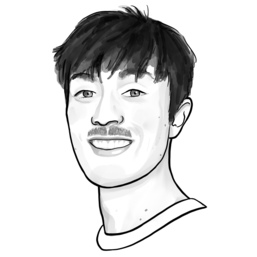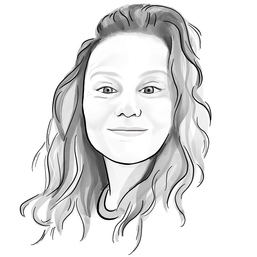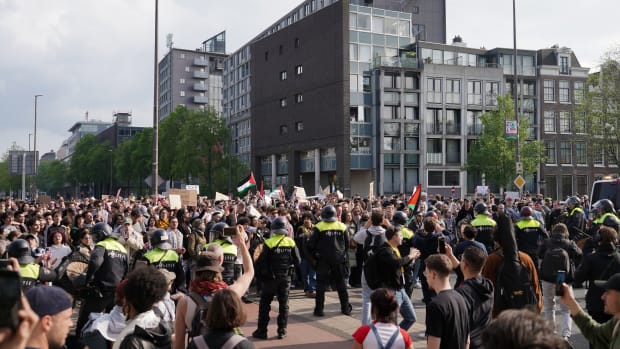
What happened, who are the protesters, and where do we go from here?
After a tumultuous week of demonstrations, the UvA’s Binnengasthuisterrein was occupied Tuesday night. The protesters want the university to sever ties with Israel. Five questions about the situation now and last week.
What happened?
Students and employees of the UvA, Vrije Universiteit, and Amsterdam University College (AUC) occupied the field near the Roeterseiland Campus (REC) - also known as “Roetersweiland” - with dozens of tents on Monday afternoon. They demanded that the UvA provide transparency about ties with Israeli institutions and companies, that the university sever those ties, and that the administration speak out about the situation in Gaza. Several times that evening, the UvA asked the protesters to leave. There was also a brief disturbance by counter-demonstrators.
At three in the morning, the ME evacuated the protest camp for trespassing after consultation with the police, the OM, and the municipality. According to the police, the situation was unsafe since barricades prevented emergency services from entering the grounds. The police indicated that the occupation had also taken on a “violent character” when occupiers removed stones from the ground en masse. A total of 140 protesters were arrested.
Following the occurrences on Roeterseiland, employees announced a “solidarity demonstration” on Tuesday afternoon. Around 4:00 p.m., over 1,000 people gathered on Roetersstraat where they gave speeches and chanted slogans. “We, the entire academic community, consisting of students, professors, and other employees, should not accept that the university allows police on campus and compromises our human rights,” said one of the speakers. After several hours, the demonstration transformed into a peaceful protest march toward downtown. There, at 6:30 p.m., several hundred protesters occupied the former Academic Club on the Binnengasthuisterrein (BG), where they erected several barricades.
The UvA did not press charges and stated Wednesday morning that it plans to hold talks with protesters. The night passed peacefully. The UvA has since announced that the occupation of BG-4 and the Oudemanhuispoort resulted in “considerable damage.”
Who exactly are the protesters?
The organizers of the demonstration consisted of students and staff from the UvA, Amsterdam University College (AUC), and Vrije Universiteit. Two student groups were involved: Students for Justice in Palestine, a collective of Amsterdam students (with nearly 6,000 followers on Instagram), and AUFree Palestine of AUC students (with over 1,500 followers). Through social media, these groups in turn reach other groups, such as the Dutch Scholars for Palestine, a network of contributors from the academic and cultural sectors, and XR Justice Now!, a branch of Extinction Rebellion working on climate justice.
The UvA stated earlier that many people from outside the universities also participated in the demonstrations.
The protesters demand that the UvA be transparent about its ties to Israeli institutions and companies. These include educational institutions as well as companies that allegedly profit from genocide, apartheid, and the “exploitation of the Palestinian people and their land.” In addition, the protesters want the university to sever all academic partnerships and contracts with Israeli institutions “that participate or contribute to genocide, apartheid, and colonial violence.” In addition, they want the UvA to speak out about the situation in Gaza.
(Text continues below the image.)
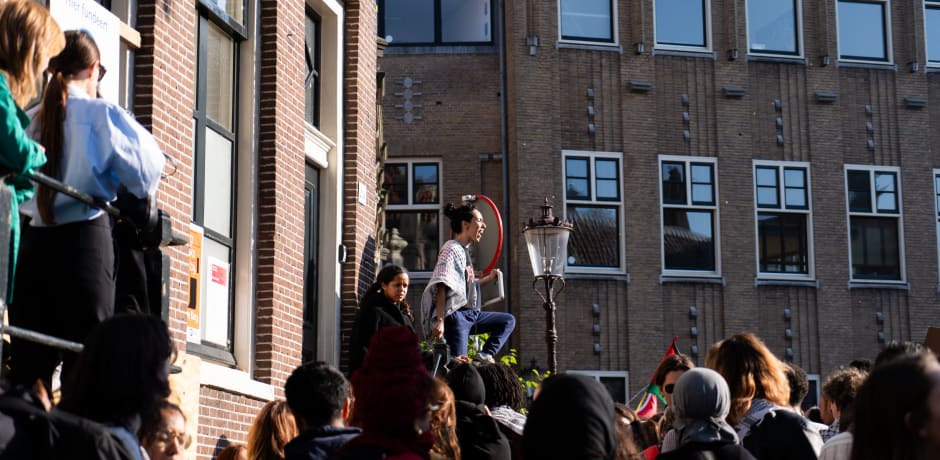
How is the UvA responding?
The UvA administration has long been criticized for its wavering, unclear stance on the Israel-Hamas war. In October, the university emphatically announced that it was facilitating meetings on the subject, including from the Central Diversity Office. “As an academic community, we have a joint responsibility to ensure that analysis and dialogue are conducted in a respectful, inclusive, and pluralistic manner,” a press release said. Further, the university said it does not want “to take a stand. Our university must provide a home for debate and criticism in accordance with agreed-upon rules, and cannot properly fulfill that function if we as an organization take an explicit position ourselves.”
But protests have persisted. In February, for example, a group of 24 scholars argued that the UvA should take a stand (“The Unbearable Lightness of UvA’s Neutrality”), especially given that the university had done so for the Ukraine war. Pro-Palestine demonstrations took place on the Roeterseiland Bridge and at the Oudemanhuispoort.
Following the onset of last Monday’s protest on Roeterseiland, the UvA published a list on its website of collaborations with Israeli involvement. In doing so, the UvA sought to fulfill a demand from the occupiers, and the Central Student Council is also said to have previously requested this. The university invited UvA students and employees to engage in discussion.
This discussion took place Wednesday morning, after which it was decided to have a second discussion. According to the UvA, this would give “parties involved time to reflect on the proposals made.”
In a statement, the administration added that “holding discussions remains the solution, even at times when we are at odds with each other on campus.”
Where do we go from here?
Demonstrator and UvA history student Carlos van Eck, a member of the delegation engaging in talks with the UvA administration, says that the demonstrations will continue “until the university has met our demands. We also hope we won’t have to stay for three weeks or longer,” he says. “There is a genocide taking place in Gaza right now. The UvA can still show moral leadership by being the first university in the Netherlands to publicly break ties with Israel. We won’t leave before then.” Van Eck says that, like the UvA, he is also in favor of constructive talks. “But those talks should be more about how and when the ties will be severed, rather than about a compromise.” Van Eck expects students and staff to become “even angrier” if the demonstration is cleared again. He brushes aside the fact that universities may not be so quick to pull out of all sorts of partnerships. “When the war in Ukraine broke out, ties with Russian institutions were also frozen.”
(Text continues below the image.)
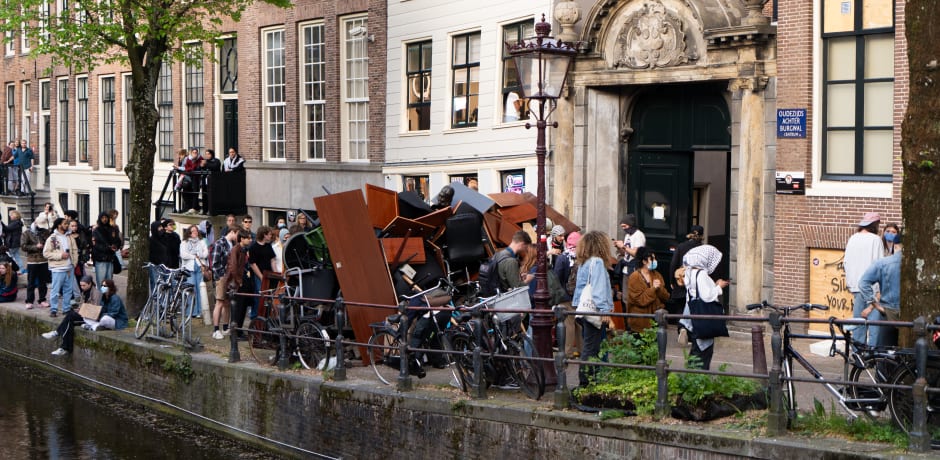
How are politicians reacting to this?
From The Hague, several parties are eyeing the Pro-Palestine protests critically. Outgoing Minister Dijkgraaf of Education, Culture, and Science emphasizes that there is no place at educational institutions for intimidation, violence, or destruction. “Universities should be a safe place for everyone,” Dijkgraaf told NOS. “It is very important that the voices of students and teachers be heard and that external people do not hijack these protests and make them violent.”
This morning, PVV leader Wilders and BBB leader Caroline van der Plas also responded to the demonstration. “I think it’s terrible,” Wilders said. “It is good that action is being taken. The sooner, the harder, the more often, the better.”
Van der Plas said “There is nothing wrong with demonstrations...but what is happening there is complete anarchy. Entire streets are being torn apart and everything is being blocked. This is all going way too far for me.” Just last Monday, Van der Plas requested a parliamentary debate in response to “violence and obstruction of the media” during the Roeterseiland protest.
On Friday, the Amsterdam City Council will hold an emergency debate in response to the protests at the UvA. Opposition parties are critical of the space being given to the protesters and the lack of police capacity. Mayor Femke Halsema will also be present.
